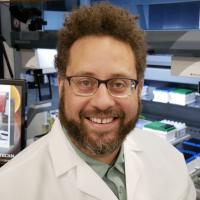From Setbacks to Breakthroughs
One Livermore scientist's journey from process breakdowns to breakthrough discoveries in lab automation

Ippolito Imani Caradonna is a staff scientist, biologist, and lab automation specialist at Lawrence Livermore National Laboratory in Livermore, CA. He is looking for opportunities to automate lab work using AI, and his work has highlighted the benefits of cross-functionality and collaboration among scientists and other stakeholders across sectors.
“I’m developing tools that scale experimental science to keep pace with the explosion of AI-generated data and predictions,” he said. He likens his work to creating an impedance match between how fast AI can “think” and how fast science can test. “It’s bringing us closer to real-time discovery,” he said.
Caradonna recently had the opportunity to attend specialized training on commercializing his research at the 2025 National Laboratories Entrepreneurship Academy (NLEA). Offered by the UC Davis Institute for Innovation and Entrepreneurship, this annual four-day event provides intensive training for select researchers at the Lawrence Livermore National Lab and Sandia National Labs.
“I chose to attend NLEA because of my passion for entrepreneurship and the need to bridge disciplines in my emerging field of laboratory automation,” Caradonna said.
“NLEA helped me understand the inventor landscape in the national lab setting and how an entrepreneurial spirit within the national labs has a critical impact on the direction and quality of scientific discovery,” he said. He also noted that the experience changed the dynamics of his existing network by deepening his understanding of the connection between national laboratories, external partners, and venture capitalists.
Mastery Through Failure
Raised in Gilroy, CA, Caradonna began his scientific journey as a biology student at UC Santa Cruz, where he worked as an undergraduate researcher. After graduation, he faced several challenges as a scientist at UC San Francisco, where his early lab work failed to replicate previous results from other labmates. A low throughput protocol that had been robust and reliable in the hands of previous lab members was failing when Caradonna attempted to scale it. “This experience humbled me and pushed me to dive deeply into the nuances of each step in the protocol,” he said. “What I didn’t realize at the time was that I was essentially performing an in-depth process optimization through my failures.”
National Labs Entrepreneurship Academy
Offered in-person each spring in Livermore, CA, the academy is a four-day intensive experience that offers pathways to innovation by teaching researchers how to bring their ideas from the lab to the market.
Participants will learn to:
- Reduce uncertainty around their idea
- Craft an elevator pitch and a business plan
- Learn market, business, and technology validation
- Engage with mentors
- Learn to build a network and grow a team
- Discover new opportunities and identify next steps
While discouraged, he was undeterred. “The more you fail at something, the closer you come to mastering it,” he said. This requires a mature level of diligence and persistence, which these challenges helped him cultivate. “What kind of father and husband would I be if I didn’t fail, learn, discover, and improve our world through science and technology?” he said.
Joe DiNunzio, Executive Director of the Institute stated that “A key theme of our academies is the importance of a growth mindset in entrepreneurship -- a commitment to learn from and capitalize on failure.” DiNunzio added “Moreover, we share with researchers a key statement that builds on the scientific method they know so well: ‘Better to be specifically wrong than vaguely right.’”
The Essential Need for Cross-Functionality
As he helps to grow the field of laboratory automation, he sees the value of cross-functionality. “The future of STEM requires individuals who can integrate multiple disciplines and collaborate across fields,” Caradonna said. “As our fields continue to blend and intersect, the need for individuals who have lived well-rounded lives and can effectively communicate across multiple disciplines becomes increasingly important. I aspire to embody this adaptability and contribute to fostering collaboration and innovation across diverse areas of expertise.
For Caradonna, this was another benefit he gained from NLEA. “Communicating complex scientific ideas clearly—especially to diverse stakeholders like those in national labs—is essential,” he said. “Attending NLEA has helped me sharpen that skill and given me a clearer path to making my work more impactful across sectors.”
Learn more about the National Laboratories Entrepreneurship Academy